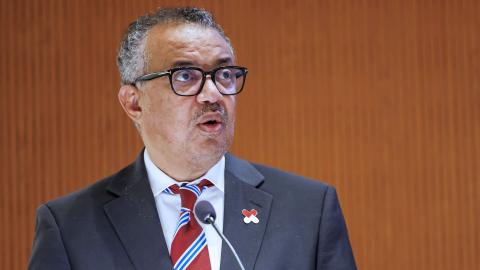
World Health Organization's Controversial Pandemic Treaty Fails, but Here's What's Next
World Health Organization (WHO) leaders say they were unable to reach an agreement for a controversial pandemic-related treaty that would increase the organization's emergency powers in case of another international health crisis.
Critics have warned the pandemic treaty would undermine U.S. sovereignty on important health decisions.
The failure to gain approval for the measure comes as WHO Director-General Tedros Ghebreyesus and 194 member states are wrapping up more than two years of negotiations on new rules for responding to pandemics during the May 27-June 1 World Health Assembly in Geneva.
So far, negotiators failed to produce a draft deal Friday for approval at this week's convention.
"WHO Member States have ended intensive negotiations aimed at strengthening global capacities to respond to future pandemics and outbreaks in the wake of the COVID-19 pandemic, and agreed to submit outcomes of their work for consideration by the upcoming World Health Assembly, starting Monday," the WHO said in a statement released Friday.
***Please sign up for CBN Newsletters and download the CBN News app to ensure you keep receiving the latest news from a distinctly Christian perspective.***
In 2021, member countries asked the WHO to oversee negotiations to determine how to best stop the spread of future viruses globally.
According to a draft treaty, the WHO would focus on closing the vaccine gap between the West and developing countries through a "Pathogen Access and Benefit-Sharing System," where countries would give the organization samples and genetic sequences of potentially dangerous pathogens, Semafor Signals reports.
In return, the WHO would provide countries with 20% of the vaccines needed.
However, the treaty also included proposals to increase the WHO's emergency powers and essentially give the organization full power over what other countries should do in a pandemic.
As CBN News reported, a coalition of U.S. senators demanded earlier this month that the Biden administration withdraw its support for two of the international agreements that would grant greater authority to the WHO and potentially weaken America's sovereignty.
"The United States cannot afford to ignore the latest WHO inability to perform its most basic function and must insist on comprehensive WHO reforms before even considering amendments to the International Health Regulations (IHR) or any pandemic-related treaty that would increase WHO authority," the group of senators wrote.
Ghebreyesus has denied the arguments that the organization is trying to gain power, arguing that the W.H.O. would not override the sovereignty of member nations.
During his opening address at this week's assembly, Ghebreyesus expressed optimism about eventually reaching a deal on a pandemic treaty.
"Of course, we all wish that we had been able to reach a consensus on the agreement in time for this health assembly, and cross the finish line," he said. "I remain confident that you still will because where there is a will, there is a way. I know that there remains among you a common will to get this done."
Negotiations are still ongoing for updates to existing health rules, but U.S. officials told Reuters it would be at least another one to two years of talks before a pandemic treaty is finalized.




